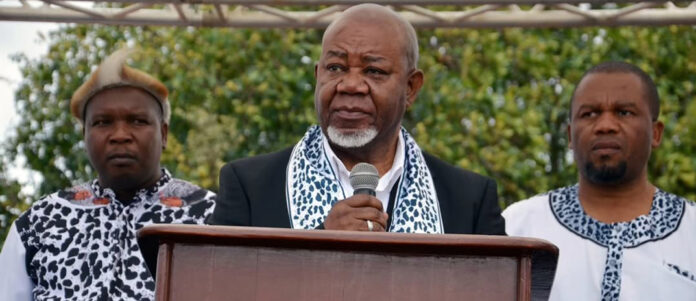The Congress of Traditional Leaders of South Africa (Contralesa) has warned African men not to be tempted by a recent Constitutional Court ruling that permits them to adopt their wife’s surname, calling the decision an “abomination” that undermines African culture and heritage.
Contralesa president Kgoši Mathopa Mokoena used the provincial Heritage Day celebration in Grootvlei, Dipaleseng Local Municipality, Mpumalanga, on Wednesday to deliver a sharp rebuke of the ruling, which he said clashes with long-held traditions. Addressing a lively gathering of community members, Mokoena accused the court of disrespecting custom and usurping the role of parliament.
“As custodians of culture, it is our task to ensure that our practices as African people are promoted and supported. Some of the things appear to be leading us astray from our traditions. They are a taboo we do not know. We discourage our people from doing it. We are speaking about the abomination you have heard,” he said.
Mokoena was scathing about what he saw as judicial overreach. “When another structure in government usurps the policy-making work of parliament and does it themselves, we as traditional leaders and Contralesa, are going to oppose it. We are going to be against it, and we are going to lambaste it. One of those is the abomination of the Constitutional Court. We cannot support such nonsense,” he said to loud applause.
Mokoena argued that the Concourt ruling has the potential to destabilize the very foundation of traditional leadership by disrupting the way lineages are preserved and passed on.
“Look at it from a chieftaincy perspective, where kingship is given according to lineage. I use the Mokoena surname but imagine me changing my surname to the first wife of Mathibela. Whose surname will my children carry? They are no longer Mokoenas in a Mokoena royal house. The kingdom is gone.”
The Contralesa president revealed that the organisation is preparing to march to the Constitutional Court in Johannesburg to “ventilate the erosion of African culture and tradition.”
He added that the march will be a direct petition to the Chief Justice and the justices of the ConCourt to reconsider the cultural consequences of their decision.
“Some women never dump their ex-husband’s surnames after their relationships break down. Then you go marry that woman and take her ex-husband’s surname. What abomination is that? Is that what you want? Never!” he thundered, drawing murmurs of agreement from the crowd.
Mokoena stated that the current legal framework prioritises Roman Dutch law over African customary law. While the Constitution recognises both, he argued, the balance has tilted dangerously.
“As traditional leaders, we are petitioning the Chief Justice and the ConCourt to hear us when we say we disagree. We will stage a serious march to ConCourt against this thing. Yet, we agree, there is this thing called Roman-Dutch law. But what about customary law? What happens to it?”
Contralesa’s strong stance adds a powerful voice to the growing debate around the implications of the ruling. While the Constitutional Court insists its decision enhances dignity and equality by giving both men and women the same choice over surnames, traditional leaders view it as an intrusion into African identity and the survival of lineages.
For now, the ruling remains the binding law. But traditional leaders have made it clear they are ready to fight – in the court of public opinion, and soon, on the streets of Johannesburg, Gauteng.



